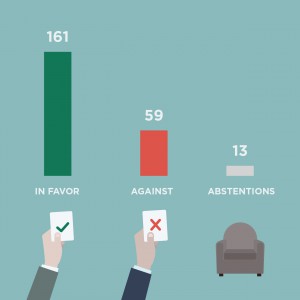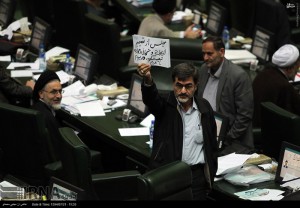The JCPOA (Barjam) and Parliament Approval
On June 21, 2015, the Iranian Parliament (Majlis) decided to form a committee to review the Joint Comprehensive Plan of Action (JCPOA), or the nuclear deal, between Iran and P5+1, and to wait at least 80 days before voting on it. The JCPOA, referred to as “Barjam”, has been a contentious issue in Iran’s parliament. Check out Majlis Monitor’s timeline on Iran’s Parliament and the JCPOA.
On October 13, 2015, Iran’s parliament approved the nuclear deal. However, this was not a smooth process, with many MPs upset over how the vote was done.
Majlis Monitor brings you a brief overview of the voting session:
- With 161 votes in favor, 59 against and 13 abstentions, Iran’s conservative-dominated parliament approved the nuclear deal between Iran and P5+1.
- MPs were upset that the voting process took only 20 minutes.
- Speaker of Parliament, Ali Larijani, was accused of pushing the vote forward and not allowing members of the parliament to give amendments and recommendations.
A number of hardline MPs, especially Hamid Rasaei and Mehdi Kochakzadeh, believed that this short voting process was the result of a secret meeting between Larijani, Ali Shamkhani (SCNS secretary) and Asghar Hejazi (a close confident of Ayatollah Khamenei).
Hamid Rasaei in criticizing the voting process stated that “Ali Larijani today, in less than 20 minutes, pushed the approval of a bill that implicitly approves the nuclear deal. He did not allow any proposals other than three proposals to his liking, and did not allow any discussions about favouring or opposing recommendations.”
Mehrdad Bazrpash also criticized the process of voting in majlis and said “The JCPOA, which was the result of 22 months of negotiations, should not get 15 minutes for a vote.” Bazrpash also added that according to Article 65 and 66 of the constitution, which defines the number of parliament members to be present for a legally valid session, was not observed and said “history will judge on this matter.”
Members of Parliament were not the only critics of this process, Kayhan(کیهان), a hardline newspaper critical of the JCPOA, published a piece called the “Parliament’s 15-minute decision for 15 years” The article stated that:
“While the members of Parliament had approximately 200 recommendations for the modification of the implementation of the nuclear deal, in an illegal act without reviewing these recommendations, the most important foreign policy file of the country was closed in parliament in 15 minutes.”
The Supreme Leader’s Office responds to Keyhan and MPs:
The Supreme Leader’s Office denies any involvement by members of the Leader’s office:
“Any false and distorted information regarding the independent role of authorities in the process of reviewing proposals from the Supreme Leader’s Office on the “reciprocal and appropriate action of the Islamic Republic of Iran to implement Barjam,” is untrue and invalid.”
Supreme Leader Khamenei also wrote a letter to president Hassan Rouhani, instructing him with a number of guidelines in implementing the JCPOA or Barjam. The letter served to address both sides of the Iran deal debate. Those in favour of the Iran deal saw it as the Leader’s “stamp of approval” of JCPOA and those against it highlighted the conditions that Khamenei has stated in the letter.
According to article 125 of Iran’s Constitution, the president has the authority to sign treaties, protocols, contracts, and agreements with other governments, as well as agreements pertaining to international organizations, after obtaining the approval of the Parliament or Majles.
Previous to the Majlis vote, there was back and forth between the Rouhani administration and Majlis on whether Iran’s Parliament has the power to ratify the nuclear deal.

